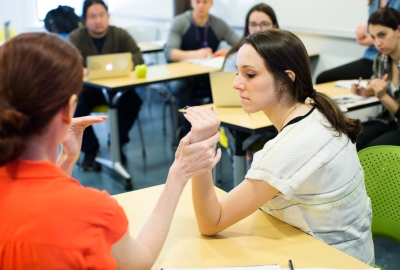
Is the OTD a PhD?
No. The OTD is a clinical, practice-oriented doctorate for the advanced clinician. Our OTD program requires you to prepare a professional portfolio. The PhD is a research degree for individuals pursuing a research and/or academic career and requires students to complete a scholarly dissertation. We also offer a PhD program for those who wish to pursue a rigorous program of research and scholarship in preparation for such a career.
What is the OTD?
The Doctor of Occupational Therapy (OTD) is a 27-36-point post-professional clinical doctoral program with specializations offered in pediatrics and upper quadrant care.
I see that the degree requires 27-36 credits. How many credits will I need to take to graduate?
Students who graduated from an ACOTE entry-level masters program within the past 10 years will be eligible for consideration for advanced standing and reduced credits. These students must demonstrate that they completed courses equivalent to NYU MS OT program's specialized courses to be eligible for this reduced credit option. Students will be instructed to submit a list of specialized courses along with the courses' syllabi. The syllabi will be reviewed by the admissions committee for potential advanced standing.
Why should I consider getting an OTD?
The OTD is an attractive and intellectually stimulating alternative for practitioners who want an advanced degree but are not seeking careers in research or academia. It will enable you to integrate your learning beyond the usual continuing education workshops and obtain the highest level of practice knowledge and expertise in a specialized area.
What will the degree do for me professionally?
The OTD program will offer you the opportunity to enhance your clinical and analytical skills, apply evidence to practice, explore a clinical area of special interest, and earn an advanced clinical degree. Advanced clinical degrees are increasingly recognized as an important credential in health care in occupational therapy and other professions. Thus, you may qualify for more responsible positions in practice and administration.
Is clinical fieldwork required?
Clinical fieldwork or a clinical residency may be selected as a learning opportunity to facilitate your goals in the educational plan for your professional portfolio. Your study plan and professional portfolio are developed at the outset of your educational program for the OTD.
Why should I get an OTD at NYU Steinhardt?
The OTD will enable you to understand, create, and deliver cutting-edge evidence-based practice. You will leave with the latest tools and clinical methods.
What makes your OTD cutting-edge and innovative?
You will study in a top-ranked occupational therapy department at a world-class university. For many clinicians, NYU is within easy commuting distance of your clinic. Clinically-relevant curriculum is offered in the late afternoons and evenings. The OTD will invigorate your career through self-directed clinical mastery and professional competence while you earn a doctoral degree.
Can I work while getting an OTD?
You can continue to work full- or part-time and study at NYU in the late afternoons and evenings on a full-time or part-time basis.
I only have a baccalaureate degree (BA or BS) in occupational therapy). Do I need a master's to apply?
Yes. You must have earned a master's degree prior to applying to the post-professional OTD program. This program is designed for occupational therapists that also have an earned master's degree.
I am already a CHT. Is the upper quadrant specialization appropriate for me?
Yes. You will be encouraged and mentored to go beyond your credentials.
Will the upper quadrant specialization prepare me as a certified hand therapist (CHT)?
Perhaps. You can incorporate this focus into your study plan and professional portfolio in order to prepare for the certification requirements both in terms of course work, study, and clinical requirements.
What is a professional portfolio?
The professional portfolio is the student-directed terminal project. The portfolio includes carefully selected "artifacts" documenting the students' reasoning, evidence of advanced competency, and scientific evidence that supports their practice. The evidence illustrates how the academic course work interfaces with advanced clinical competence.
Is a dissertation required?
No. You will complete a professional portfolio.
Where can I reach out with additional questions?
Please email occupational.therapy@nyu.edu.
